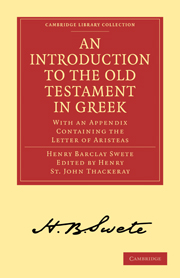Book contents
- Frontmatter
- PREFACE
- Contents
- PART I THE HISTORY OF THE GREEK OLD TESTAMENT AND OF ITS TRANSMISSION
- PART II THE CONTENTS OF THE ALEXANDRIAN OLD TESTAMENT
- PART III LITERARY USE, VALUE, AND TEXTUAL CONDITION OF THE GREEK OLD TESTAMENT
- CHAPTER I Literary use of the Septuagint by non-Christian Hellenists
- CHAPTER II Quotations from the Septuagint in the New Testament
- CHAPTER III Quotations from the Septuagint in early Christian writings
- CHAPTER IV The Greek Versions as aids to Biblical Study
- CHAPTER V Influence of the Septuagint on Christian Literature
- CHAPTER VI Textual condition of the Septuagint, and problems arising out of it
- ADDITIONS AND CORRECTIONS
- APPENDIX: THE LETTER OF PSEUDO-ARISTEAS
- INDICES
CHAPTER V - Influence of the Septuagint on Christian Literature
Published online by Cambridge University Press: 05 August 2011
- Frontmatter
- PREFACE
- Contents
- PART I THE HISTORY OF THE GREEK OLD TESTAMENT AND OF ITS TRANSMISSION
- PART II THE CONTENTS OF THE ALEXANDRIAN OLD TESTAMENT
- PART III LITERARY USE, VALUE, AND TEXTUAL CONDITION OF THE GREEK OLD TESTAMENT
- CHAPTER I Literary use of the Septuagint by non-Christian Hellenists
- CHAPTER II Quotations from the Septuagint in the New Testament
- CHAPTER III Quotations from the Septuagint in early Christian writings
- CHAPTER IV The Greek Versions as aids to Biblical Study
- CHAPTER V Influence of the Septuagint on Christian Literature
- CHAPTER VI Textual condition of the Septuagint, and problems arising out of it
- ADDITIONS AND CORRECTIONS
- APPENDIX: THE LETTER OF PSEUDO-ARISTEAS
- INDICES
Summary
1. The Church inherited from the Hellenistic Synagogue an entire confidence in the work of the Alexandrian translators. It was a treasure common to Jew and Christian, the authorised Greek Bible to which at first both appealed. When after the beginning of the second century a distrust of the LXX. sprang up among the Jews, Christian teachers and writers not unnaturally clung to the old version with a growing devotion. They pleaded its venerable age and its use by the Evangelists and Apostles; they accepted and often embellished the legend of its birth, and, following in the steps of Philo, claimed for it an inspiration not inferior to that of the original. When the divergences of the Septuagint from the current Hebrew text became apparent, it was argued that the errors of the Greek text were due to accidents of transmission, or that they were not actual errors, but Divine adaptations of the original to the use of the future Church.
Iren. iii. 21. 3 “quum…Deus…servavit nobis simplices scripturas in Aegypto…in qua et Dominus noster servatus est… et haec earum scripturarum interpretatio priusquam Dominus noster descenderet facta sit et antequam Christiani ostenderentur interpretata sit…vereimpudorati et audaces ostenduntur qui nunc volunt aliter interpretationes facere, quando ex ipsis scripturis arguantur a nobis…etenim apostoli quum sint his omnibus vetustiores, consonant praedictae interpretationi, et interpretatio consonat apostolicae traditioni. […]”
- Type
- Chapter
- Information
- An Introduction to the Old Testament in GreekWith an Appendix Containing the Letter of Aristeas, pp. 462 - 477Publisher: Cambridge University PressPrint publication year: 2010First published in: 1900



